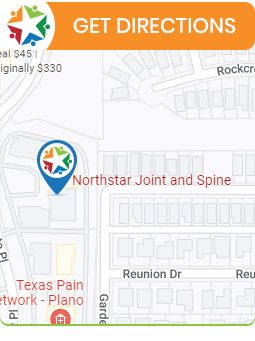Management & Treatment of Knee Osteoarthritis in Plano, TX
At Northstar Joint and Spine, Board Certified Dr. Robert J. Nocerini, MD, offers effective management and treatment for knee osteoarthritis. This degenerative condition can cause pain, stiffness, and decreased mobility. Our team focuses on methods to relieve pain, improve joint function, and restore movement, helping patients regain a more active and comfortable lifestyle. For more information, contact us today or book an appointment online. We are conveniently located at 7704 San Jacinto Pl Suite #200 Plano, TX 75024.




Table of Contents:
What is osteoarthritis?
Who gets osteoarthritis of the knee?
What causes knee osteoarthritis?
What does osteoarthritis in the knee feel like?
How can Dr. Robert J. Nocerini, MD, at Northstar Joint and Spine help me manage and treat my knee osteoarthritis effectively?
Osteoarthritis in the knee can quickly start to affect how comfortably you are able to live your life and perform your daily activities, often taking a significant toll on your quality of life if left untreated. Anyone can develop osteoarthritis, so if you are suffering from any pain, stiffness, or sensitivity in your joints, it is highly recommended that you get those symptoms assessed by a medical professional to ensure that the symptoms are treated early and that any possible conditions or diseases are diagnosed to prevent further development and problems down the road.
There are several different types of arthritis, the most common type being osteoarthritis. Osteoarthritis is known for affecting joints as it causes the cartilage between the joints to break down, damaging the bones themselves if left untreated. Due to its ability to degenerate, osteoarthritis only gets worse with time and often causes chronic pain in the affected joints. It occurs most commonly in the hands, hips, and knees, and often leads to pain, swelling, flexibility, and stiffness, making the affected joint much less mobile or usable. If any of those joints start to lose proper functioning, it can quickly start to affect the overall quality of life of those suffering from osteoarthritis, so quality treatment is recommended.
There are a few factors that can cause someone to be at a higher risk of developing osteoarthritis of the knee. One of the most influential factors is if you have used the knees excessively causing repetitive stress on the joint by bending more than the average person. Having damage done to a joint can lead to a higher risk of developing osteoarthritis in that joint down the road. Increased risk for developing osteoarthritis can also be caused due to obesity as the excess weight adds more strain and stress to the joints, and obesity has been shown to have negative metabolic effects further increasing the risk. Age and gender also play a role, as the risk of developing osteoarthritis increases with age and is more common in women. Additionally, those who have a family history of osteoarthritis or have previously developed osteoarthritis in their hands are at an increased risk of developing it in their knees.
Osteoarthritis does not occur simply due to regular wear and tear on the joints, even though that can increase the risk of developing arthritis, it is considered a degenerative disease, meaning that something actually changes in the body to trigger the breakdown of the tissues and the joint, but it is still unclear to researchers what actually causes that change. This change in the tissue happens gradually over time, making it slightly more difficult to diagnose until enough damage has been done to cause pain and sensitivity, and eventually the complete degradation of the cartilage to the point where the bones are starting to wear down by rubbing on one another. Even though there is no one true cause that has been found yet for osteoarthritis, there are other factors that can contribute to increasing the risk of developing the disease, primarily age, but really anyone can develop osteoarthritis in their knees without there being a concrete cause.
Osteoarthritis in the knee will slowly worsen with time, so the symptoms will start out fairly mild, often only including mild pain, sensitivity, and stiffness. With time, many patients will find it difficult and painful to run, jump, kneel, or climb stairs. Your knee will likely feel stiff, most frequently when you first get up after sitting for a long period of time, or when you first get up in the morning. Many patients will report hearing a grinding or cracking noise when they move their knees as well. It may become more difficult to put weight on the affected knee, as it could feel as if the knee will buckle or give in. Due to the stiffness becoming more severe with time as well, your knee might feel as if it is “locking up” or stuck in a specific position. As well, the affected knee may start to change in shape due to swelling and the degradation of the tissues and cartilage.
We’d be very happy to have you in for a consultation with us here at Northstar Joint and Spine in Plano TX. Our pain management Dr. Robert J. Nocerini MD, will take a look at your medical history, history of pain, and current symptoms to help him with diagnosis. And once he understands your pain and the condition causing it, he will suggest any number of treatments that will both relieve your pain and provide a method for managing your condition.
Dr. Robert J. Nocerini, MD, a board-certified physician at Northstar Joint and Spine, is dedicated to effectively managing and treating knee osteoarthritis. With years of experience in pain management and orthopedic care, Dr. Nocerini offers a personalized, comprehensive approach to help patients alleviate knee pain and improve mobility without the need for surgery.
Comprehensive Diagnosis and Evaluation: As a board-certified expert, Dr. Nocerini begins with a thorough evaluation to assess the severity of your knee osteoarthritis. He carefully examines your medical history and performs diagnostic tests to create an accurate picture of your knee’s condition, ensuring a targeted treatment plan.
Non-Surgical Treatment Options: Dr. Nocerini utilizes a variety of non-surgical treatment options tailored to your specific needs.
Personalized Care Plan: With his expertise, Dr. Nocerini crafts a customized care plan that addresses your unique condition. This plan focuses on managing symptoms, reducing inflammation, and restoring knee function, all aimed at helping you lead a more active and pain-free lifestyle.
For more information contact us today or book an appointment online. We are conveniently located at 7704 San Jacinto Pl Suite #200 Plano, TX 75024. We serve patients from Plano TX, Willow Bend TX, Frisco TX, Allen TX, Addison TX, North Dallas TX, and surrounding areas.

Check Out Our 5 Star Reviews


Additional Services You May Need
▸ Back Pain
▸ Shoulder Pain
▸ Chronic Pain
▸ Epidural Steroid Injections
▸ Spinal Cord Stimulation
▸ Viscosupplementation
▸ Genicular Nerve Blocks
▸ Facet Injections
▸ Joint Injections
▸ Sacroiliac Joint Injections
▸ Lumbar and Cervical
▸ Facet Medial Branch Blocks
▸ Diagnostic Nerve Blocks
▸ Medication Management
▸ Neck Pain Doctor
▸ Diabetic Peripheral Neuropathy
▸ Headaches
▸ Suboxone
▸ Peripheral Nerve Stimulation
▸ Spine
▸ Joints
▸ Muscles
▸ Bones

Additional Services You May Need
▸ Back Pain
▸ Shoulder Pain
▸ Chronic Pain
▸ Epidural Steroid Injections
▸ Spinal Cord Stimulation
▸ Viscosupplementation
▸ Genicular Nerve Blocks
▸ Facet Injections
▸ Joint Injections
▸ Sacroiliac Joint Injections
▸ Lumbar and Cervical
▸ Facet Medial Branch Blocks
▸ Diagnostic Nerve Blocks
▸ Medication Management
▸ Neck Pain Doctor
▸ Diabetic Peripheral Neuropathy
▸ Headaches
▸ Suboxone
▸ Peripheral Nerve Stimulation
▸ Spine
▸ Joints
▸ Muscles
▸ Bones






